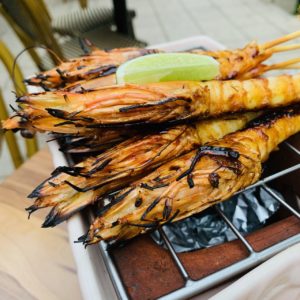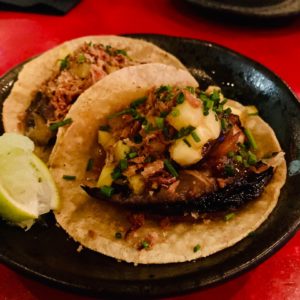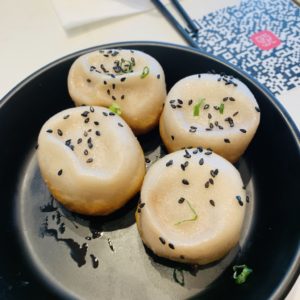 My family has always been obsessed with food. It needed to tasty and cheap, and bonus points if you knew or liked the people providing it. Combining our Asian heritage with our Asian thrift meant that our favourite restaurants were a series of Cantonese restaurants in Vancouver my family adopted for as long as I remember: home-style cooking, nothing too fancy, unpretentious decor, and delicious food. “King Hong” was the first one I remember, steaming bowls of the house soup – a clear broth with huge pieces of carrots, honey garlic ribs, big pieces of crisp tofu, and a few times, on special occasion: sturgeon. Chongs was its successor, and we went for years. Mom bringing her own green beans from the garden to them to fry in fermented bean paste; steamed fish, hotpots.
My family has always been obsessed with food. It needed to tasty and cheap, and bonus points if you knew or liked the people providing it. Combining our Asian heritage with our Asian thrift meant that our favourite restaurants were a series of Cantonese restaurants in Vancouver my family adopted for as long as I remember: home-style cooking, nothing too fancy, unpretentious decor, and delicious food. “King Hong” was the first one I remember, steaming bowls of the house soup – a clear broth with huge pieces of carrots, honey garlic ribs, big pieces of crisp tofu, and a few times, on special occasion: sturgeon. Chongs was its successor, and we went for years. Mom bringing her own green beans from the garden to them to fry in fermented bean paste; steamed fish, hotpots.
 While people often equate economy with stinginess, it was the opposite in my family – who had no greater delight than to introduce others to our favourite Chinese restaurants, pay the bill, and brush it off by saying that it wasn’t expensive. When I visit old college friends around the world, they remind me that their first experience of Chinese food was with my parents – and I have some wonder at how many of my friends my parents have treated to dinner.
While people often equate economy with stinginess, it was the opposite in my family – who had no greater delight than to introduce others to our favourite Chinese restaurants, pay the bill, and brush it off by saying that it wasn’t expensive. When I visit old college friends around the world, they remind me that their first experience of Chinese food was with my parents – and I have some wonder at how many of my friends my parents have treated to dinner.
The other value instilled by my family was that food should be unusual or particular to a place and season. My mother delighted in the cheeks of fish, even small ones, the tiny tenderest morsel, and so now, we, her children do the same. Hawaii, my mother’s birthplace, was the opportunity to eat fresh papaya and mangoes, barracuda, custard pies, Portuguese donuts, soft-fried wonton in gravy: things best bought and consumed locally. So, we got used to tasting the difference between plates in different countries, and know, for example, that the wonton beef brisket noodle soup in Vancouver is likely better than anywhere else in the world for its alchemy of the softest meat, slightly chewy fresh egg noodles, and savoury broth.
 My experiences in Europe changed the way that I ate. During my student life in Canada, we tended to have potluck dinners (or “bring a plate” as they say in Australia), during which we would experiment with vegetarian recipes from the Moosewood Cookbook. In fact, so many of friends were vegetarian that I didn’t learn to cook with meat.
My experiences in Europe changed the way that I ate. During my student life in Canada, we tended to have potluck dinners (or “bring a plate” as they say in Australia), during which we would experiment with vegetarian recipes from the Moosewood Cookbook. In fact, so many of friends were vegetarian that I didn’t learn to cook with meat.
In Brussels, I was introduced to the “dinner party”. I had little to do then aside from work, and was cut off from the French and Flemish cultural life of the city. Many of the people I made friends with invited me over for meals. My first invitation was to the home of my cultured and kind friends Nils and Henri. I admit embarrassment, recalling the 25 year old Canadian, astonished that a meal would come in different courses with a different wine for each course. I was awed and delighted and think that I probably didn’t enjoy the food as much as I could have, as I was somewhat bewildered and hoping that I didn’t make a dining faux-pas.
 But after that I started to throw my own dinner parties. I learned to make several courses. I learned to cook meat. I learned that they didn’t have to be complicated if the food was good in the first place – and I’d never tasted such high quality produce – a market near my apartment in Brussels had 15 different varieties of lettuce, at a time when I probably only knew iceberg and romaine! I still remember the quality of the duck breasts at my local butcher in London. With some effort, perhaps I would have been able to find this quality of food in the Canadian cities that I’d lived in, but I was a student then, and didn’t really care. But Brussels made it easy. If I was short on time, chocolates would make do as dessert, and nowhere else are there chocolate shops on every corner, pralines freshly made and available in wonderful variety. I was lucky to know so many fine restaurants and so much fine wine in Europe.
But after that I started to throw my own dinner parties. I learned to make several courses. I learned to cook meat. I learned that they didn’t have to be complicated if the food was good in the first place – and I’d never tasted such high quality produce – a market near my apartment in Brussels had 15 different varieties of lettuce, at a time when I probably only knew iceberg and romaine! I still remember the quality of the duck breasts at my local butcher in London. With some effort, perhaps I would have been able to find this quality of food in the Canadian cities that I’d lived in, but I was a student then, and didn’t really care. But Brussels made it easy. If I was short on time, chocolates would make do as dessert, and nowhere else are there chocolate shops on every corner, pralines freshly made and available in wonderful variety. I was lucky to know so many fine restaurants and so much fine wine in Europe.
 After Europe, I lived in Sydney and finally had the economic power to eat at good restaurants regularly, the opportunity to travel and try good restaurants in different cities. Sydney is a city where people dine out a lot, and have less dinner parties. The restaurants are superb – with inventive chefs using high-quality produce – and I love the Asian-influence on fine dining. A review long ago argued that Sydney has the best Thai food in the world, better than Thailand even, due to the availability of ingredients, skill of chefs, and the spirit and daring of both Sydney chefs and diners.
After Europe, I lived in Sydney and finally had the economic power to eat at good restaurants regularly, the opportunity to travel and try good restaurants in different cities. Sydney is a city where people dine out a lot, and have less dinner parties. The restaurants are superb – with inventive chefs using high-quality produce – and I love the Asian-influence on fine dining. A review long ago argued that Sydney has the best Thai food in the world, better than Thailand even, due to the availability of ingredients, skill of chefs, and the spirit and daring of both Sydney chefs and diners.
 And then the world entered the phase of fine dining, popularised. There were many restaurants in Sydney specializing in degustation menus which range from five to ten courses, opportunities to savour a whole range of foods as well as the expertise of the chefs. And then the whole world seemed to be celebrating eating these days, with hit TV shows and cookbooks and celebrity chefs. And trying to dine at Noma or Heston Blumenthal’s latest. I jumped onto this trend wholeheartedly, partly because I became romantically involved with partners who were willing to dine with me at these restaurants. It’s easier to go somewhere nice as a couple. When my husband and I travel, we usually make sure we go to a top restaurant or two: Michelin-starred meals in France and Denmark were particularly memorable.
And then the world entered the phase of fine dining, popularised. There were many restaurants in Sydney specializing in degustation menus which range from five to ten courses, opportunities to savour a whole range of foods as well as the expertise of the chefs. And then the whole world seemed to be celebrating eating these days, with hit TV shows and cookbooks and celebrity chefs. And trying to dine at Noma or Heston Blumenthal’s latest. I jumped onto this trend wholeheartedly, partly because I became romantically involved with partners who were willing to dine with me at these restaurants. It’s easier to go somewhere nice as a couple. When my husband and I travel, we usually make sure we go to a top restaurant or two: Michelin-starred meals in France and Denmark were particularly memorable.
 During this period, I even had my time as a food blogger. I was so inspired by the meals that I was eating, I decided to write about them and put photos up on my blog. And then, a series of websites made it easy to put up reviews, like eatability.com.au and yelp.com.au, and zomato even made a game of it, where the more reviews you put up, the higher you ranked on a list of a city’s top food bloggers.
During this period, I even had my time as a food blogger. I was so inspired by the meals that I was eating, I decided to write about them and put photos up on my blog. And then, a series of websites made it easy to put up reviews, like eatability.com.au and yelp.com.au, and zomato even made a game of it, where the more reviews you put up, the higher you ranked on a list of a city’s top food bloggers.
It was a fun time, but that period of my life didn’t last. With the news Noma is closing, there have been many interesting articles that perhaps this era of fine dining should come to a close. The restaurants are only accessible to the wealthy. The chefs and staff are time-poor, and money-poor, from it, and burn out. They don’t make sense economically nor in terms of the mental health of those who provide the food. The end of my food blogging was mostly because of stopping going to restaurants, which was a result of COVID lockdowns. During this period, I unexpectedly discovered a passion for home cooking (and making cocktails). I’d always enjoyed throwing a dinner party but suddenly, I became really, really excited about cooking delicious meals for the two of us. One inspiration came from a challenge from friends on Facebook to cook our way through countries alphabetically, from A to Z. And a more recent inspiration is the cookbook, Tenderheart, by Hetty Lui McKinnon which has moved us towards eating less meat, with ease rather than effort, because the recipes are so inspiring.
 When I was an angsty teenager, I used to complain that my parents expressed their love to me through food (and generosity in paying for food) rather than through direct expression. Of course, I have become them, fussing over dishes before a dinner party, thinking nothing could be better than a successful course! Meanwhile, I know my parents were proud of me for my delight in food – something that I inherited from them, and from our Chinese culture, and have integrated it into my life now. At the very least, it gave and gives us something to talk about. And there was no better moments in my adult life when I was able to take my parents to special meals (two occasions stand out: a gastronomique restaurant in the Belgian countryside, and Sydney’s Tetsuya’s when it was at its peak popularity) and insist: it was my treat.
When I was an angsty teenager, I used to complain that my parents expressed their love to me through food (and generosity in paying for food) rather than through direct expression. Of course, I have become them, fussing over dishes before a dinner party, thinking nothing could be better than a successful course! Meanwhile, I know my parents were proud of me for my delight in food – something that I inherited from them, and from our Chinese culture, and have integrated it into my life now. At the very least, it gave and gives us something to talk about. And there was no better moments in my adult life when I was able to take my parents to special meals (two occasions stand out: a gastronomique restaurant in the Belgian countryside, and Sydney’s Tetsuya’s when it was at its peak popularity) and insist: it was my treat.
